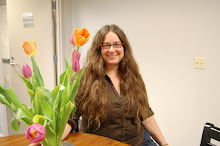1. Living at the Odin TeatretI thought about deleting that big block of Odin detail, but visually it does show what 2004 was like for me. Living at the Odin was the culmination of 7 years' work, and it hit me like Thor's hammer. It took the rest of the year to digest that accomplishment and experience.
- Karin, Mia, Magnus, Anna, Else Marie, Lilicherie, Georgie, Eugenio, Sigrid, Roberta, Rina, Ulrik, Patricia, Raul, Clelia, Nando, Jurgens, Antonio, Julia, Iben, Kai, Frans, Tage, Jan, Augusto, Torgeir, Jerzy, Fernando, Adrian, Phillip, the mask guy, the set guys, Lone, Hanne, Karen, Pushpa
- Icelandic winds
- gleaming wood floors in the White Room, Black Room, Red Room, Blue Room
- Grotowskiøs spirit
- the Polish Laboratory Theatre Hamlet poster with the dead dog & the gulls
- my book
- cappucinos, the Internet cafe, tea, coffee
- quick silent lunches of avocado & cheese during rehearsal
- actors' clothes & instruments hung in the backside of the set
- the bibliotek
- the fast computer and the slow one
- small hot showers
- Suzuki slow-tens in the Blue room with tulips opening as we worked
- that visiting theatre I missed
- Teatret Om, whose two actors took me to Italian dinner
- Turkish musicians, sounding like Kai
- Iben & Frans's piece at the library
- Thorsminde
- writing Eugenio from Grotowski's room
- Danish, Italian, French, Portuguese, Spanish, Norwegian, Swedish, English
- Nye nye nye nye nye
- drying your clothes on the hot-water pipes
- grey stones in the yard
- my small orange key
- all those blue binders of Eugenio's writings
- "Murde! Murde!" -- Roberta calling like a cheerful Lady Macbeth for Tuesday's meeting
- Tage hanging in a harness playing the small trumpet
- Chekhov with yellow ropes and a saddle
- game training
- the performance for one spectator
- Anna's piece on stilts with a wagon
- choreographing ballet with Augusto
- Ingebord singing with guitar as the doomed traveller
- Kai singing Spieleman
- Magnus with a drum on his head, Karin on flute
- Kai ululating
- Roberta & Torgeir's Polish pottery
- Julia's walnut pesto pasta
- Else Marie's napkins
- Clelia teaching me about Japanese theatre,
- translating Danish poetry
- the thousand dreams of Andersen
- physical & vocal training every morning at 8
- puppets playing with fire
- the Dutch videographer women & the interviews
- whispers of Elsinore
- Work Exchange with Theatre du Soleil
- various Danish birthday songs
- Odin's 40th Birthday
- the Center for Laboratory Theatre Studies
- sitting in Eugenio's seat at my goodbye lunch and feeling the neural impact of the company
- Mia's cake for me borne in on a litter with candles by the laborante singing
- the whole company singing me that Campiagno song with all the verses
- cold fresh air
2. My mom's cancer all gone
3. The whole year off
4. Blogging
Kipley, JJ, Mark, Scott, Rik, *Anon, TLR, Eeksy, Lightness, Sioran, World, Lohans, Nancy, me...
...plus my daily tools: Blogger, Google, GoogleImages, Picasa, Hello, Painter, Sitemeter, Guestmap, XP, AOL, Office, Photoshop, MSN Messenger, the internet, and Moore's fantastic Law
5. Reconnecting with my family
6. John, my brother, Joan; house & car; miracles
7. Infinite friends
Radmila, Kris, Jeff, Rob W., Giancarlo, Ed, Sal, Chris B., Jim R., Andrew, Dawid
8. Akropolis's Dream of a Ridiculous Man
Joseph, Jennifer, Eric, Catherine, Dostoeyevski
9. My Nanda Devi
Macbeth, Improv, Jitka, BCC, Starbucks Journal, Milestone Three
10. Kama Ginkas's Rothschild's Fiddle
Kama, John Freedman, Chekhov, Liz, Yale
11. Bart Sher's Singing Forest
for all the magnificent dead
Malte; Dorothy, Erwin, Allen from Our Town
12. Life coaching, McCarthy bootcamps, the hint of Google
sing for the winterMay all sentient beings find happiness. May all sentient beings find peace.
sing for the dead, sing for the
joy springing from grief
Have a great new year. As Kipley says, "Catch ya on the flip-flop."







































